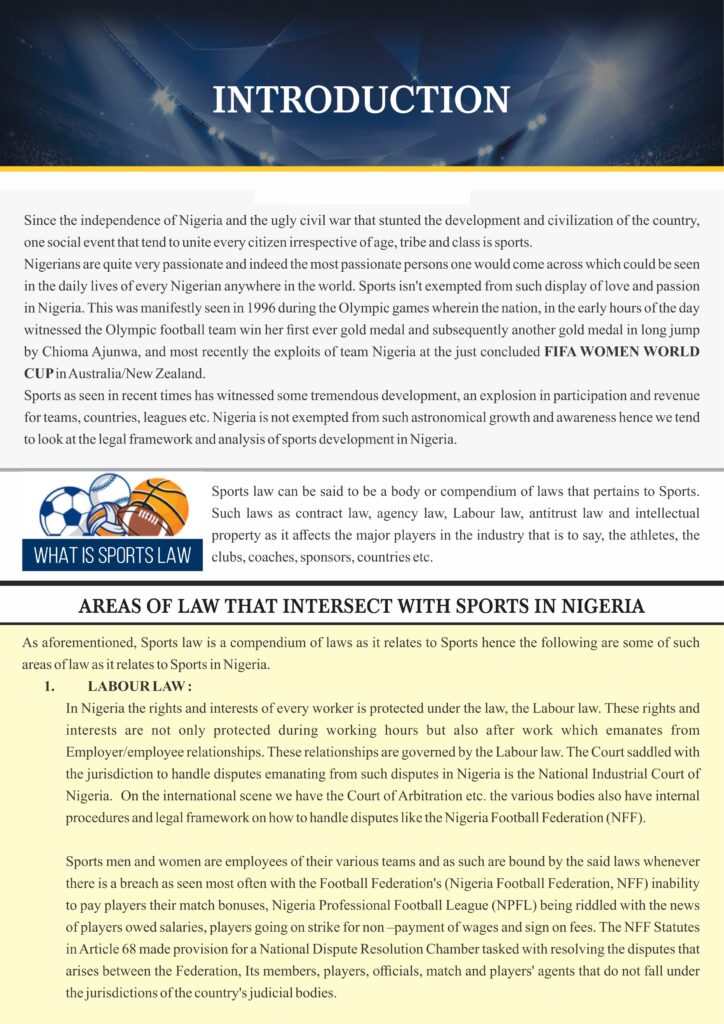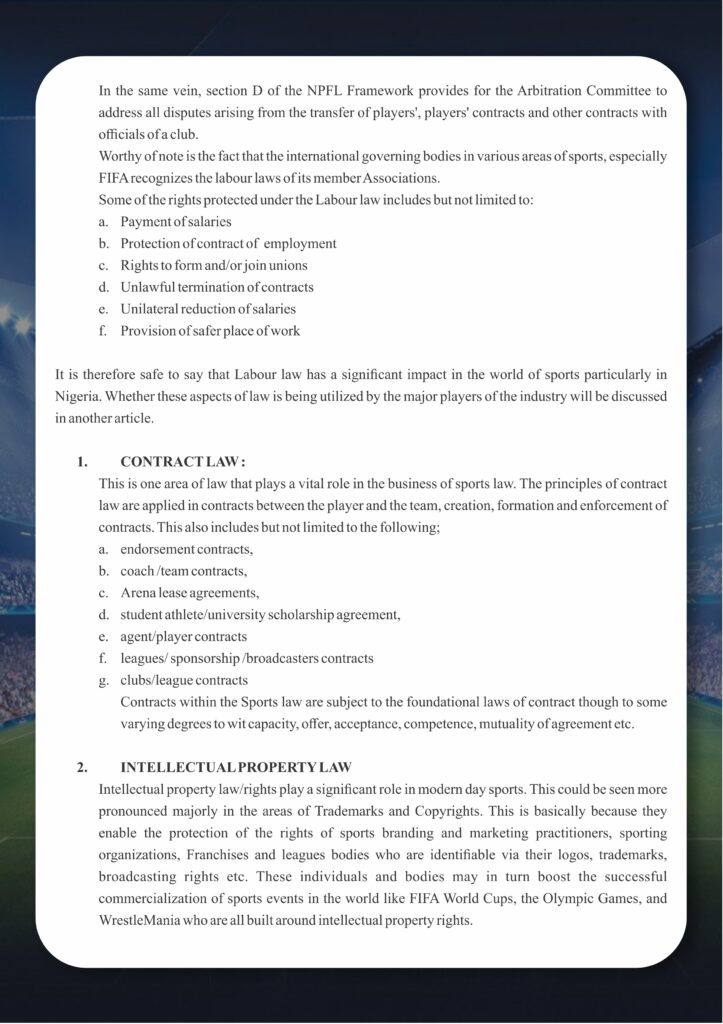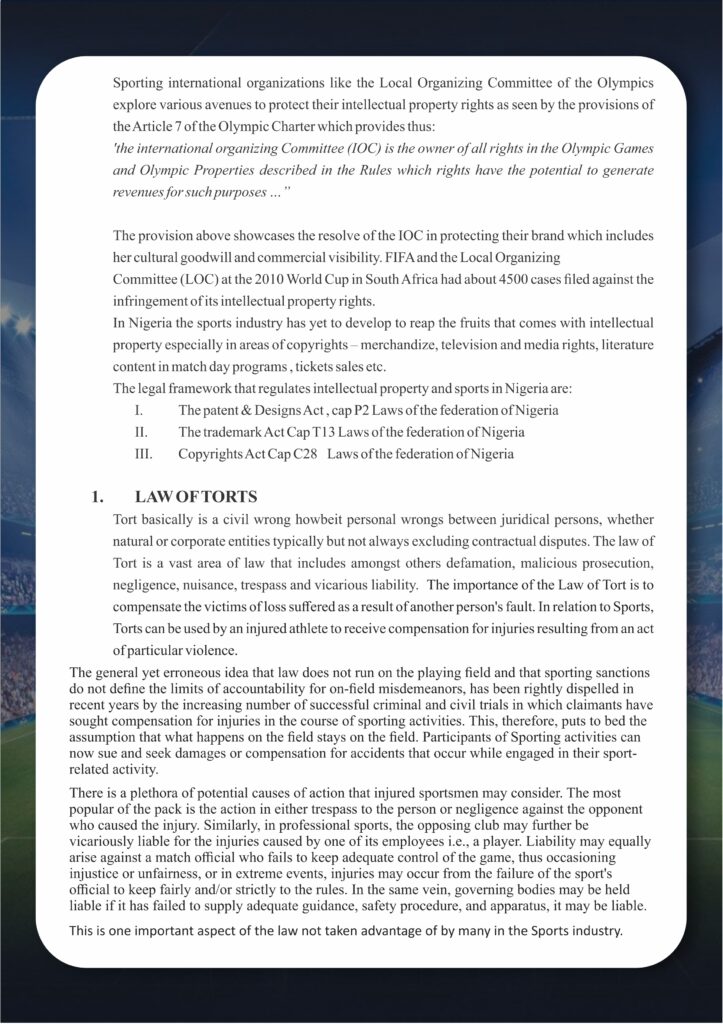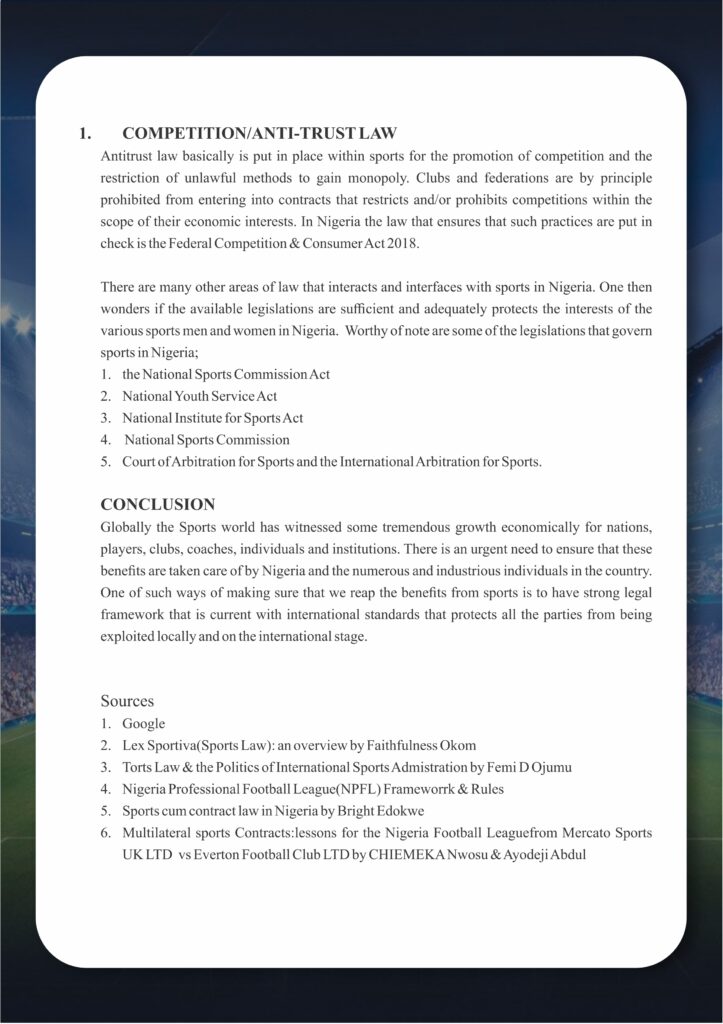SPORTS LAW IN NIGERIA: A COMPARATIVE ANALYSIS
By: Obinna Onuoha Esq




By: Obinna Onuoha Esq




By: Victory Sarah Opawoye

By: Obinna Onuoha Esq

INTRODUCTION
Exportation is simply the outflow of goods and products from Nigeria into other countries for commercial purposes. The procedures for export is governed by various laws and regulations made by different government agencies responsible for export operations in Nigeria. The legal framework for import and export laws in Nigeria primarily consists of the following key regulations and agencies:1. Customs and Excise Management Act (CEMA): The CEMA is the primary legislation governing customs and excise matters in Nigeria. It provides the legal basis for the assessment and collection of customs duties, the control of imports and exports, and the establishment of the Nigeria Customs Service (NCS).
2. Nigeria Customs Service (NCS): The NCS is the agency responsible for implementing customs laws and regulations in Nigeria. It oversees the collection of customs duties, the classification of goods, and the enforcement of import and export restrictions.
3. Federal Ministry of Finance (FMF): The FMF plays a supervisory role over the NCS and is responsible for setting tariff rates and import/export policies in coordination with other relevant government agencies.
4. Central Bank of Nigeria (CBN): The CBN regulates foreign exchange transactions and manages the foreign exchange market in Nigeria. It has a significant impact on import and export activities through its foreign exchange policies.
5. Export Promotion Councils: Various export promotion councils, such as the Nigerian Export Promotion Council (NEPC), exist to promote and facilitate exports from Nigeria. They provide support and information to Nigerian exporters.
6. Import Prohibition List and Export Prohibition List: Nigeria maintains lists of goods that are prohibited for import and export. These lists are periodically updated by the government to reflect current policies and national interests.
7. Trade Agreements: Nigeria is a member of regional economic communities like the Economic Community of West African States (ECOWAS) and has trade agreements with other countries and regions. These agreements can influence import and export regulations and tariffs.
8. National Agency for Food and Drug Administration and Control (NAFDAC): NAFDAC regulates the importation and exportation of food, drugs, and other related products to ensure they meet safety and quality standards.
9. Standard Organization of Nigeria (SON): SON is responsible for establishing and enforcing product standards, including those related to imports and exports.
2.0 Documents Required for Exportation
Exporting goods from Nigeria also requires specific documents to ensure compliance with regulations. The essential export documents include:
An export contract is the agreement between an international buyer and seller. An exporter should pay attention to details of the export contract agreed upon by parties. International contracts can be complex. It is therefore recommended that you seek appropriate advice from a Professional.
Important components of an international export contract include:
4.0 Procedure for Exportation
To carry on the business of exportation, the exporter is mandated to incorporate a company with the Corporate Affairs Commission (CAC). Upon incorporation, the exporter is required to register with the Nigerian Export Promotion Council (NEPC) and obtain the exporter’s certificate to be eligible for NEPC benefits. The exporter will also complete the NXP Form with an authorized dealer, which is any reputable bank in Nigeria.
Also, an export contract may be executed between the exporter and the importer which sets out the obligations of the exporter and importer.
It is the responsibility of the exporter of any commodity to ensure an appropriate license or export permit has been obtained from various regulatory agencies before attempting to export any consignment. For instance, an exporter of any solid minerals must obtain an export permit from and pay royalty through the Ministry of Mines and Steel Development (MMSD).
The Agent (Forwarder) plays significant roles in facilitating exportation on behalf of the exporters. By and large, the functions of an Agent during the export process include the followings:
Make arrangements for transportation to Port.
The agent is also expected to make arrangements for inspection by the Nigerian Customs Service, the SSS, Nigerian Drug Law Enforcement Agency, and other authorized government agencies.
Make payment for the prescribed duty where applicable.
Make the necessary payment of the shipping company charges, that is, the Freight.
The agent is also to book space with the shipping agent.
He may also make payment for terminal operators’ chargers.
The shipping companies also play pivotal roles in the export of any goods from Nigeria. The major duties of a shipping company are to accept the cargo at the port of departure from exporter under the bill of lading contract, transport and deliver the same to the consignee.
In closing, it is important to state that that the import license is required to be obtained from the various government agencies such as the Standard Organization of Nigeria, National Agency for Food and Drug Administration, Department of Petroleum Resources, among others before relevant products can be brought into Nigeria. Also, in the case of importation, importers are to be aware that some products are banned from being imported into Nigeria by the Federal Government, which are contained in the Nigerian Customs Service import prohibited list.
It’s important to note that regulations and legal frameworks can change over time, so it’s advisable to consult with legal experts or relevant government agencies for the most up-to-date information and guidance on import and export laws in Nigeria.
References:
Trust relationships are formed when a trustee is obligated based on equity, to hold property,
whether it is real or personal possessions. The essence of this relationship lies in ensuring that
the benefits of the property do not accrue to the trustee, but rather to the beneficiaries or other
designated individuals or entities.
Trust law is a powerful legal framework that plays a crucial role in safeguarding wealth. By
establishing trusts, individuals and businesses can protect their assets, ensure efficient
management and secure financial well-being for future generations.
Within a trust, the trustee assumes a position of confidence and is required to act in good
faith, upholding the interests of the beneficiaries and safeguarding the trust property. It is
crucial that the trustee refrains from engaging in actions that could jeopardize the
beneficiaries’ interests.
Trusts exist in various forms and serve diverse purposes, often reflected in their names.
Contrary to popular belief, trusts are not exclusively for the wealthy, but can also be
established by individuals with limited means for their own benefits or those of others.
In this article we will delve into the significance of trust law and the roles of a trustee by
exploring realistic examples that highlight its personal application and the positive impact.
The Okonjo family, a prominent business dynasty in Nigeria, for decades has built a vast
empire spanning industries such as oil, real estates and telecommunications. However, as the
family grew in size and complexity, concerns arose about the long-term preservation and
succession of their wealth.
The Okonjo family sought the expertise of trust lawyers who crafted a comprehensive trust
structure to safeguard their assets. By placing their wealth within trust, they created a legally
binding arrangement that separated ownership from control. This not only protected their
assets from potential risks and disputes but also ensured continuity and stability.
ROLES OF A TRUSTEE
TYPES OF TRUSTS
LEGAL FRAMEWORK
The provisions of a trust arrangement can be enforced in any court of law when disputes
arise.
BENEFITS OF TRUSTEESHIP

ASALAW LP 2023 WEBINAR
Asalaw LP, a leading law firm in Nigeria, is hosting an upcoming webinar that you don’t want to miss. The webinar will cover two important topics that are relevant to anyone interested in international business law and commercial law.
The first topic is “International Investment Law: A Regime in Continuous Crisis.” This session will explore the challenges facing international investment law and the impact these challenges have on businesses operating across borders.
The second topic is “Basic Concepts and Importance of Negotiating Arbitration Clauses in Commercial Agreements.” This session will provide valuable insights into the importance of arbitration clauses in commercial agreements and how to effectively negotiate them.
If you’re involved or interested in international business law and commercial law, this webinar is a must-attend event. Don’t miss this opportunity to learn from industry experts and gain valuable insights into these important topics. Register now https://bit.ly/asapwebinar2023 to secure your spot and join us for this informative and engaging webinar.